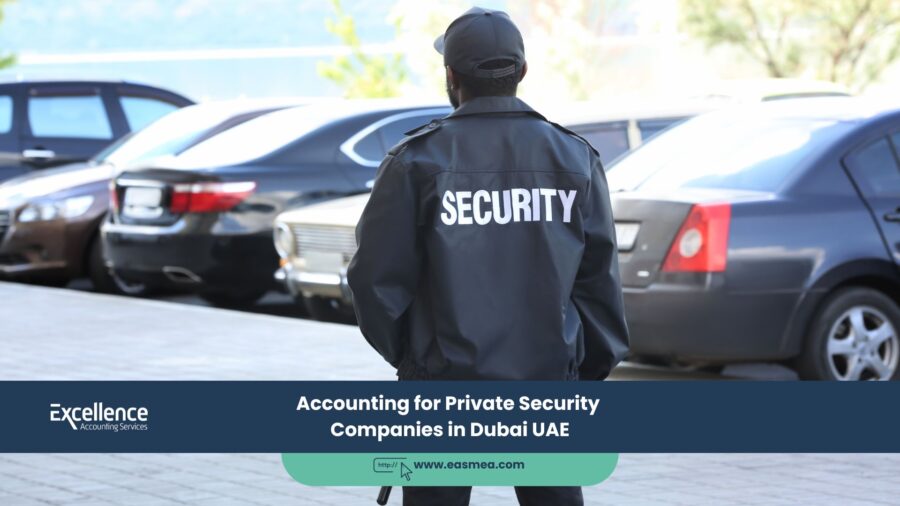In a city that prides itself on safety and security, private security companies in Dubai are an indispensable part of the landscape. They protect everything from residential communities and corporate towers to major events and critical infrastructure. While the service they provide is one of vigilance and protection, the business of private security is a highly regulated, labor-intensive operation where financial discipline is the key to survival and profitability.
Accounting for a private security company in Dubai is a specialized discipline that must navigate the stringent requirements of regulatory bodies, manage the industry’s single largest cost—labor—with extreme precision, and handle the financial complexities of long-term service contracts. Without a robust accounting framework, even a company with numerous contracts can find its margins eroded by inefficient scheduling, compliance costs, and poor cost control.
This definitive guide provides a strategic blueprint for Accounting for Private Security Companies in Dubai UAE. We will explore the critical financial practices that are essential for success in this sector, from accurate costing for each security contract to the correct revenue recognition methods. We will also provide clarity on navigating the UAE’s tax landscape and the vital compliance requirements set by the Security Industry Regulatory Agency (SIRA).
Whether you provide manned guarding, event security, or high-tech surveillance services, this guide will equip you with the financial knowledge to build a resilient and profitable operation. We will cover industry best practices, essential financial controls, and the reporting that builds trust with clients, regulators, and financial institutions, ensuring your business is as secure as the clients you protect.
Key Takeaways
- Labor Cost Management is Paramount: The business is dominated by labor costs. Profitability hinges on efficient guard scheduling, managing overtime, and accurately costing labor for each contract.
- SIRA Compliance Drives Costs: Adherence to regulations from Dubai’s Security Industry Regulatory Agency (SIRA) is mandatory and dictates costs related to guard training, certification, and operational standards.
- Contract Costing is Essential: You must know the precise cost of servicing each client contract, including guard wages, uniforms, transport, and overhead, to ensure your pricing is profitable.
- Revenue Recognition for Contracts: Revenue from long-term security contracts must be recognized systematically over the life of the contract, not all at once when payment is received.
- VAT and Corporate Tax Compliance: Security services are subject to 5% VAT, and company profits are subject to 9% Corporate Tax. Compliant accounting is a legal necessity.
The Financial Anatomy of a Private Security Company
A private security company is a service-based business where the primary product is the provision of trained and licensed personnel. The business model is built on long-term contracts for manned guarding, supplemented by ad-hoc services for events or temporary assignments. The financial structure is characterized by very high labor costs, significant regulatory compliance costs, and the need for meticulous operational planning to ensure profitability.
Operating in Dubai means all activities are strictly governed by the Security Industry Regulatory Agency (SIRA). As detailed on the official SIRA website, this body sets the standards for licensing, training, and operational conduct for all security companies and personnel. These regulations are not optional; they are the law, and they form the cost basis around which your entire financial model must be built.
The Core Challenge: Managing a High-Volume Workforce
Labor is, without question, the largest and most complex expense for any security company, often representing 70-80% of total costs. Managing this workforce effectively is the single most important factor in achieving profitability. This involves more than just payroll; it’s about strategic deployment. It means creating efficient rosters to provide the contracted coverage without incurring excessive overtime, managing transportation logistics for guards across multiple sites, and ensuring full compliance with UAE Labour Law and the Wages Protection System (WPS).
Your accounting system must be capable of handling complex payroll calculations, including overtime, allowances, and provisions for end-of-service gratuity. Furthermore, it must allow you to allocate the specific cost of each guard to the specific site or contract they are working on. This is the foundation of accurate contract costing.
The Core of Accounting for Private Security Companies in Dubai UAE
The fundamental principle of accounting for private security companies in Dubai UAE is to move beyond a simple overview of company-wide profit and loss and drill down to the profitability of each individual client contract. This requires a robust job costing or contract costing system that provides a clear view of the financial performance of every site you protect.
This detailed approach is the only way to ensure your pricing is accurate, your operations are efficient, and your business is sustainable. It transforms your accounting from a historical record-keeping function into a strategic tool for operational improvement.
Contract Costing: The Key to Profitability
To know if a security contract is profitable, you must calculate all the direct costs associated with servicing that specific contract on a monthly basis. This includes:
- Direct Labor: The full cost of the guards assigned to that site, including their basic salary, overtime, allowances, and a provision for their leave pay and end-of-service gratuity.
- Transport Costs: The allocated cost of transporting guards to and from the site.
- Uniforms & Equipment: The amortized cost of uniforms and any site-specific equipment provided.
- SIRA & Licensing Fees: The allocated cost of the guards’ SIRA licenses and other certifications.
- Supervision & Management: A portion of the salaries of patrol supervisors and operations managers.
In the security business, a contract without proper costing is just a liability in disguise. You might be busy, but you could be busy losing money.
By subtracting these total monthly costs from the monthly revenue you receive from the contract, you can determine its gross profit margin. This analysis is vital. It will immediately highlight any unprofitable contracts, allowing you to renegotiate terms or, if necessary, make an informed decision not to renew. It is the most important financial report for an operations manager. A professional bookkeeping service can be essential in setting up this level of detailed tracking.
Revenue Recognition for Long-Term Contracts
Most security services are provided under long-term contracts (e.g., 1 or 2 years). Revenue from these contracts should be recognized on a straight-line basis over the life of the contract. If a client pays for a quarter or a full year in advance, this cash must be recorded on your balance sheet as a liability (“Deferred Revenue”). Each month, you would then recognize one month’s worth of the contract value as earned revenue on your income statement. This accrual-based method is required by IFRS and provides a true and fair view of your company’s performance by matching the revenue earned with the costs incurred in the same period.
Navigating Tax and Regulatory Compliance
A professional private security company in Dubai must operate with an unwavering commitment to compliance. This includes the operational rules set by SIRA and the financial regulations set by the UAE’s Federal Tax Authority (FTA). Failure in either area can result in severe penalties, including the loss of your operating license.
VAT on Security Services
The provision of security services in the UAE is subject to the standard 5% rate of VAT. You are required to charge 5% VAT on all your invoices to clients for guarding services, event security, or any other related services. You must collect this VAT and remit it to the FTA through your periodic VAT returns. It is crucial that your invoices are fully compliant with FTA regulations.
You are also entitled to reclaim the input VAT you pay on your business expenses. This includes the VAT on uniforms, security equipment, vehicles, fuel, office rent, and professional fees. An organized and professional accounting system is essential to ensure you accurately track and reclaim all eligible input VAT, which has a direct positive impact on your company’s cash flow. For expert assistance, consider our specialized VAT services.
Corporate Tax for Security Companies
Your security company will be subject to the 9% UAE Corporate Tax on its annual taxable profits that exceed AED 375,000. Your taxable profit is determined from your IFRS-compliant financial statements. This makes accurate accounting a legal necessity. All legitimate business expenses incurred for the purpose of generating income are deductible. For a security company, this is dominated by your labor costs, but also includes vehicle expenses, insurance, SIRA fees, and depreciation on your assets. Maintaining complete and organized documentation for every single cost is mandatory to support your tax return. Professional corporate tax services are vital for ensuring you meet these obligations correctly.
What Excellence Accounting Services Can Offer
At Excellence Accounting Services (EAS), we understand the unique operational and financial pressures of the security industry. We know that profitability is driven by workforce efficiency and strict cost control, all within a highly regulated environment. We offer specialized accounting services designed to provide the financial command and control you need to run a successful operation in Dubai.
Our specialized offerings for security companies include:
- Contract Costing and Profitability Analysis: We help you implement robust systems to track the exact cost and profitability of every single client contract and site.
- Labor Cost Management: We assist with complex payroll, ensuring compliance with WPS and helping you analyze labor costs for better operational efficiency.
- Revenue Recognition for Contracts: We ensure your revenue from long-term contracts is recognized correctly over time, providing an accurate picture of your financial performance.
- VAT and Corporate Tax Compliance: Our tax experts will manage all your FTA filings, ensuring you are fully compliant and your tax position is optimized.
- Budgeting and Financial Advisory: We provide detailed budgeting, cash flow forecasting, and strategic financial advice to help you grow your business. For more details, see our Virtual CFO services.
By partnering with EAS, you gain a financial team that understands the front line of your business. We provide the financial security that allows you to focus on protecting your clients.
Frequently Asked Questions (FAQs)
You need to build up the total cost per hour. Start with the guard’s basic wage per hour. Add the hourly cost of their benefits (leave pay, health insurance, end-of-service provision). Add the hourly cost of their uniform, SIRA license, and training. Add the hourly cost of transport and supervision. This gives you your total “fully-loaded” direct cost per hour for that guard. On top of this, you must add a percentage to cover your company’s overheads (office rent, admin staff) and finally, add your desired profit margin. This bottom-up calculation ensures your charge-out rate is comprehensive and profitable.
This ensures your financial statements accurately reflect the true cost of your labor for the period and the total amount your company owes to its employees at any given point in time. When an employee leaves and is paid their final settlement, the payment is deducted from this liability account, not recorded as a new expense.
Yes. The fees you pay for mandatory SIRA training and the licensing of your security personnel are a direct and necessary cost of doing business in this regulated industry. As such, these costs are fully deductible as a business expense when calculating your taxable profit for UAE Corporate Tax purposes.
Another method is to allocate based on the number of guards at each site. The key is to choose a reasonable and consistent method and apply it across all contracts to ensure fair and comparable profitability analysis. This allocation process is a fundamental part of detailed accounting for private security companies.
Uniforms can be treated in two ways. For a simple approach, the cost of uniforms can be recorded as an expense (e.g., “Uniform Expense”) in the period they are purchased. A more accurate method, especially if you hold a large stock, is to treat them as an inventory asset. When uniforms are purchased, their cost goes into an “Inventory” account. When a uniform is issued to a guard, its cost is then moved from inventory to an expense account. This provides better control and tracking.
You can calculate your break-even point for the new contract and then add your desired profit margin to arrive at a price that is both competitive in the market and guaranteed to be profitable for your business. This strategic use of financial data is what separates market leaders from others.
This is a short-term project, and the accounting is more straightforward. You would calculate the total cost for the single day: the daily wage for all 20 guards, transport, any specific equipment rental, and a portion of your overheads. You would issue a single invoice for the event. The revenue is recognized on the day the event takes place, and all the costs are expensed in the same period, giving you a clear profit or loss for that specific event.
You must charge them 5% VAT on your invoice. Conversely, if you are providing security for an event your client is holding in another country, that service would generally be outside the scope of UAE VAT. It’s also crucial to diligently track all the input VAT you pay on your expenses (uniforms, vehicles, rent, etc.), as this can be recovered from the government, directly reducing your net tax liability and improving your cash flow.
The most common mistake is under-pricing due to a failure to understand the total “fully-loaded” cost of labor. Many companies price their contracts based only on the basic salary of the guards, forgetting to factor in the significant additional costs of visas, insurance, SIRA fees, training, uniforms, transport, leave pay, and the legally required end-of-service gratuity provision. This leads to winning contracts that are fundamentally unprofitable from day one.
The end-of-service gratuity is a major liability that must be properly accounted for. Under IFRS and UAE Labour Law, you must accrue for this cost. This means that every month or year, you should calculate the gratuity liability that has been earned by your employees to date and record this as an expense on your income statement and a growing liability on your balance sheet. This ensures your profits are not overstated and that you have a true picture of what your company owes. Failing to accrue for this can lead to a sudden, large cash flow crisis when long-serving employees resign.
Yes. If the vehicles are purchased and used exclusively for the purpose of your business (e.g., for supervisors to conduct site visits and patrols), then you can reclaim the 5% input VAT you paid on the purchase of these vehicles. You can also reclaim the input VAT on their running costs, such as fuel and maintenance. It is essential to maintain all tax invoices and logbooks to prove the business use of the vehicles.
Using a dedicated workforce management or scheduling software is the most effective way. These systems help you create optimized rosters that ensure all sites are covered according to the contract while minimizing unnecessary overtime. They can automatically flag potential conflicts or shifts that will trigger overtime pay, allowing your operations team to make adjustments in advance. This technology provides a huge return on investment by directly controlling your largest expense.
This highlights the importance of clear documentation. Your contract with the client must specify the terms for any extra coverage or overtime. All overtime work should be supported by clear records, such as timesheets signed by the client’s representative on-site or data from your scheduling software. If there is a legitimate dispute, you may need to negotiate. From an accounting perspective, if you agree to waive a portion of the invoice, you would issue a credit note to the client, which reduces your revenue and accounts receivable.
It’s critical because your biggest expense—payroll—must be paid on a fixed schedule (monthly), and you cannot be late. Your revenue from clients, however, can be slower, with many corporate clients paying on 30 or 60-day terms. This creates a potential cash flow gap. A detailed cash flow forecast allows you to predict your cash balance week by week, ensuring you will always have enough funds on hand to meet your payroll obligations on time. It is the most important financial tool for ensuring the stability of your operation.
Conclusion: The Foundation of a Secure and Profitable Operation
In the high-stakes world of private security in Dubai, trust, reliability, and vigilance are your brand. The financial foundation that supports this brand must be equally robust and disciplined. A professional approach to accounting is not a back-office chore; it is a core component of your risk management strategy and the engine of your profitability.
By mastering the art of contract costing, maintaining rigorous control over your labor force, and navigating the complex regulatory and tax landscape with expertise, you build a business that is truly secure. This financial clarity empowers you to price your services with confidence, manage your operations with efficiency, and build a reputation for professionalism that sets you apart. In the business of protection, sound financial management is what ultimately protects your own success.
Secure Your Margins. Protect Your Profit.
Let Excellence Accounting Services provide the specialized financial management and regulatory insight your security business needs to succeed in Dubai.




